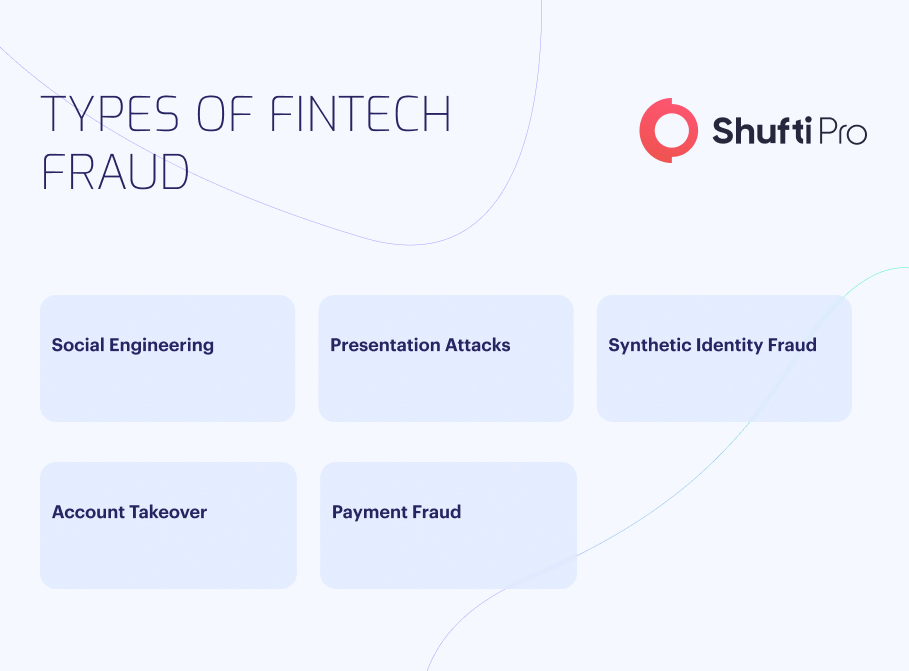e-IDV: The Key to Fraud Prevention in FinTech

After years of enormous growth, investment in the fintech market declined in 2022. Susceptibility to scams is one of the main reasons why fintech is becoming less attractive. UK Finance has said that bank fraud is a “threat to national security.” Consumers in Great Britain lost £609.8 million during the first half of 2022. However, the figure shows a decrease of 13% from $754 million in the previous year. The UK Finance added that there are no signs of cybercrime slowing down despite the drop in fraud losses. The rising number of identity theft and data breaches puts pressure on fintech companies to understand different types of fintech fraud and how to avoid them.
Types of Fintech Fraud
With technological advancement, scammers are becoming sophisticated enough to bypass verification processes and fulfil illicit intentions. Let’s dive deeper into how a scammer perpetrates fraud in the fintech sector.

1. Social Engineering
In social engineering, impersonators manipulate victims to disclose sensitive details (such as account passwords) or transfer funds. Scammers impersonate them to pay through ways that are impossible to recover, like via crypto.
2. Presentation Attacks
A presentation attack is when a scammer uses someone’s biometric data or physical traits to impersonate and access their digital accounts.
3. Synthetic Identity Fraud
Scammers commit synthetic identity fraud by combining legitimate personal information, such as a social security number, with fake data. They do this to create a fake identity that they can use to avoid identity verification checks whilst opening financial accounts. Children, the elderly, and the homeless are the most typical victims of this form of fraud since they are extremely unlikely to use credit or check their credit history.
4. Account Takeover
Account Takeover (ATO) fraud occurs when criminals obtain unauthorised access to financial accounts using credential stuffing, password alterations, or email address modifications. ATO fraud cost the government $11 billion in 2022.
5. Payment (ACH) Fraud
Automated Clearing House (ACH) is a convenient and cost-effective way for companies and customers to exchange money. But as ACH usage grows, so does ACH fraud. ACH scams can occur when criminals access bank account data, which they then use to fraudulently withdraw (debit) monies from these accounts through ACH transactions.
Suggested Read: Shufti Identity Fraud Report 2022
e-IDV to the Rescue
Electronic Identity Verification (e-IDV) confirms an individual’s identity by matching entries of name, Date of Birth (DOB), address, and other particular criteria from private and public data sets. This is the first stage in the Know Your Customer (KYC) procedure.
e-IDV is used by many financial companies throughout the customer due diligence process to protect against fraud and to comply with Anti-Money Laundering (AML), Counter-Terrorism Financing (CTF), and KYC regulations.
Benefits of e-IDV
The fintech sector is fast expanding, and with the increasing popularity of online financial services, the necessity for adequate electronic ID verification has become critical.
1. Enhanced Security
Fraud prevention is a top priority for fintech companies. Conventional identity verification methods, such as physical document checks, are time-consuming and prone to human mistakes. e-IDV improves security by analysing and verifying user data using advanced algorithms and Artificial Intelligence (AI) technology. This decreases the risk of identity theft and fraud by detecting discrepancies and abnormalities that human inspections may overlook. Furthermore, e-IDV enables fintech firms to access and analyse a wealth of data from multiple sources, including government databases, to validate an individual’s identification, increasing security measures.
2. Streamlined Onboarding Processes
e-IDV can substantially simplify the process of onboarding for fintech organisations. Traditional onboarding techniques frequently demand consumers to visit physical locations or submit genuine copies of proof of identity, leading to lengthy and inconvenient processes. In contrast, e-IDV eliminates the requirement for physical presence or paper-based documents. This saves onboarding time and effort and makes it easier for clients to sign up for financial services. Further, e-IDV could be integrated into the business’s digital platforms, like mobile apps or websites, to provide a streamlined and user-friendly experience.
3. Compliance with Regulations
Fintech firms must comply with some regulatory standards, including AML and KYC regulations, which demand extensive identification verification processes. Failure to follow these regulations can have severe financial and reputational ramifications. By offering a robust and consistent approach to verifying the identity of its consumers, e-IDV assists fintech companies in meeting these compliance obligations. It also keeps a detailed audit record of the verification procedure, which might be helpful in the event of regulatory audits or inquiries.
4. Improved User Experience
e-IDV may enhance the user experience for fintech clients significantly. Traditional means of identification verification, such as presenting physical documents, can be time-consuming and inconvenient, resulting in a negative user experience. However, with e-IDV, customers can validate their identification remotely without needing paper-based proof. This enables a smooth onboarding experience, which is critical in today’s competitive fintech industry for recruiting and maintaining consumers. Furthermore, e-IDV can be linked to client journeys, like loan applications or account openings, to provide clients with a seamless and fast experience.
5. Cost Savings
Fintech companies can save money by implementing e-IDV. Conventional identity verification methods are time-consuming and labour-intensive, increasing operational costs. e-IDV streamlines the identification process by eliminating the need for human involvement and the accompanying costs. Furthermore, e-IDV enables fintech firms to obtain and analyse data from several sources, removing the need for duplicate data gathering and verification procedures. It not only saves money but also increases operational efficiency.
How Can Shufti Help?
Shufti has launched an e-IDV solution that authenticates identities with unmatched precision. The process is paperless and extremely user-friendly as the customer needs to just provide their ID number, and they are good to go. Our e-IDV solution took no more than 5 seconds to verify identities, helping the FinTech sector onboard customers faster with an accuracy rate of 99.3%. Our e-IDV solution is simple to integrate, fully adaptable to location and language and helps customers safely and securely open digital wallets and comply with central banking laws and regulations.
Still confused about how an e-IDV solution is the best investment in the fintech sector?











